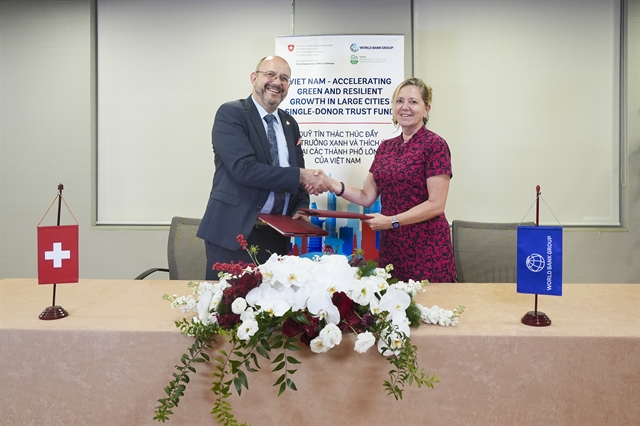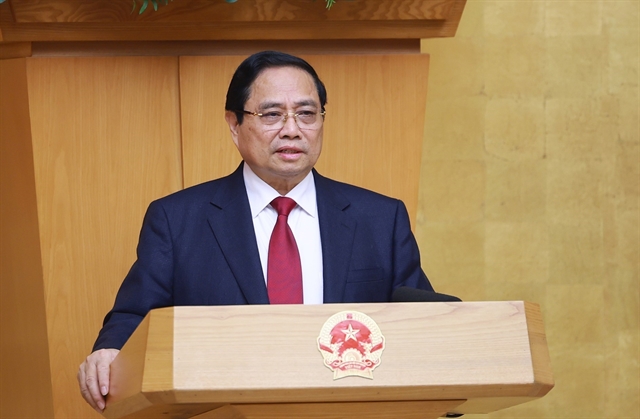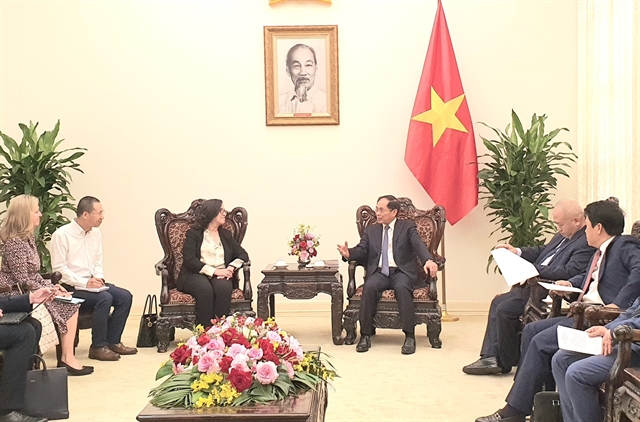 Society
Society

 |
| Deputy Prime Minister and Minister of Foreign Affairs Bùi Thanh Sơn (right) had talks with World Bank (WB) Vice President for East Asia and the Pacific Manuela V. Ferro in Hà Nội.— VNA/VNS Photo Chu Thanh Vân |
HÀ NỘI — Deputy Prime Minister and Minister of Foreign Affairs Bùi Thanh Sơn on Wednesday received World Bank (WB) Vice President for East Asia and the Pacific Manuela V. Ferro who is paying a working visit to Việt Nam.
During the reception, Sơn hailed the WB's decision to establish a regional office in Hà Nội and shared his desire to work closely with the office, noting the WB is a reliable partner that has significantly supported Việt Nam's socioeconomic development.
He affirmed that Việt Nam is committed to strengthening the partnership with WB and hopes to continue to cooperate with the WB in programmes to promote sustainable growth, green economy, digital economy and circular economy in the near future.
The Deputy PM informed the guest that the Government of Việt Nam has established a working group headed by a Deputy Minister of Planning and Investment to closely coordinate with the WB office in Việt Nam to solve challenges related to the implementation of WB projects. This will help reduce preparation and approval time, especially when there are differences between Việt Nam's and WB’s regulations.
Sơn welcomed the WB's proposal to lend to Việt Nam for the next five years focusing on key areas such as infrastructure (large-scale transport projects), energy (energy transition and renewable energy), and agriculture (environmentally friendly initiatives such as low-emission rice cultivation projects).
The Deputy PM called on the WB to continue to simplify the approval process and adopt a flexible approach in the negotiation process to address challenges, and asked the WB to provide more non-refundable aid to mitigate the impact of high-interest loans from the International Bank for Reconstruction and Development (IBRD). In 2017, Việt Nam graduated from the status of an Official Development Assistance (ODA) recipient, specifically from the International Development Association (IDA) of the WB.
According to Sơn , the Vietnamese Government has submitted to the National Assembly amendments to some laws to simplify procedures and solve challenges related to disbursement and planning for projects using ODA and foreign concessional loans.
He suggested that the WB's regional office continue to work closely with relevant agencies of Việt Nam to study and propose solutions to shorten the preparation time for projects and solving cases where there are differences in regulations of Việt Nam and the WB.
Acknowledging Việt Nam's success in economic development over the past time, the WB Vice President said her visit to Việt Nam this time aims to discuss measures to make Việt Nam a high-income country by 2045, which depends a lot on both internal factors and external factors. She noted that Việt Nam has benefited from the openness of international trade.
The WB wants to help Việt Nam identify opportunities and risks along with suitable investments, she said, adding that the WB always provides support in accordance with the context and development investment needs, and is ready to support Việt Nam in the upcoming development.
Manuela took note of an improvement in the disbursement of projects funded by WB loans in Việt Nam, but it is still slow.
According to her, one of the advantages of a higher income status is that it has conditions and access to the international financial market. It can mobilise capital from many different sources to serve its development process. — VNA/VNS




